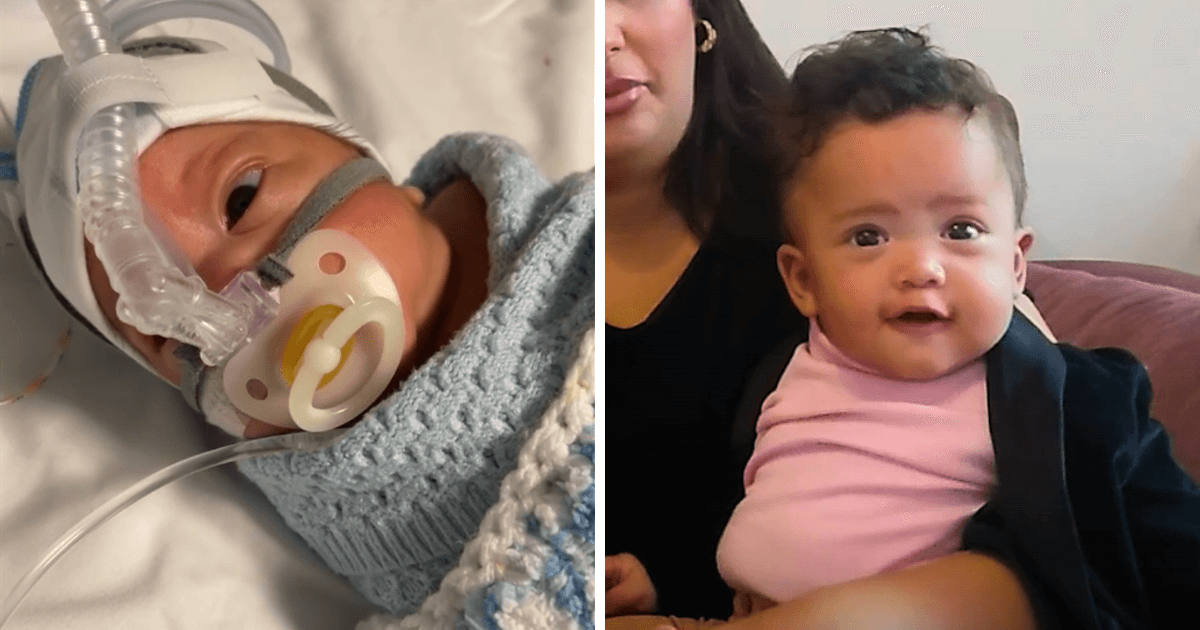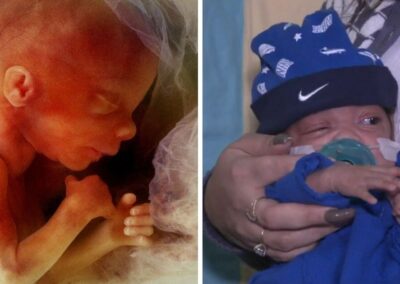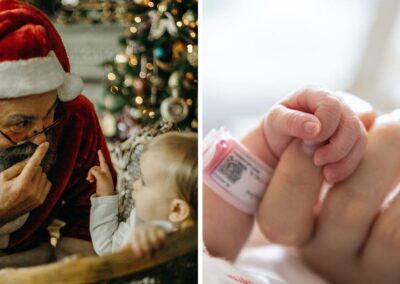A tiny baby boy, born at 26 weeks and weighing less a kilo, has now grown to roughly ten times this size and is thriving at home.
Baby Caleb’s parents Reuben and Marianna Dawkins were initially overjoyed when Marianna became pregnant since they had wanted a baby for a long time.
“It was very exciting”, the 33-year-old father said. “We’ve been trying for one and a half years, and there were times where I didn’t think it would happen and resigned myself to that”.
“When I found out Marianna was pregnant, I was extremely overjoyed. I bought everything that I wanted to buy from Mamas and Papas. Our parents were extremely happy”.
However, Mariana started experiencing pains when she was just 26 weeks pregnant and had to be rushed to hospital and was informed that the baby was coming that day.
Parents in shock as baby is delivered at 26 weeks
“It was a massive shock”, Reuben said. “I didn’t really know much about prematurity and the risks. I was excited because I wanted to meet my son. Then the doctor told us about the risks, and said at this stage, he had an 80-90 per cent chance of survival, and a 70 per cent chance of having a disability. That was the worst point, because you’re terrified of what could happen”.
Marianna said “The midwife on the phone said she could hear I was in labour from the breaths I was taking. I thought the worst straight away because I didn’t fully consider premature births and didn’t realise that you can save babies at that gestation”.
Caleb was born within three hours of contractions starting, which is referred to as precipitous labour. He weighed just 836 grams.
“Lots of thoughts were going through my head, and the immediate thought was that I was losing him”, Marianna said. “I was overwhelmed with panic and thought ‘what if something happens to me?’ I remember seeing blood and thinking not only would I lose him, I would put myself at risk. It was a really overwhelming situation. I didn’t have time to get my head round it fully. I remember the doctor reeling off the statistics to prepare us for the worst, and me not being able to take it all in”.
A challenging stay in the Neonatal Intensive Care Unit
Caleb was immediately put into an incubator in the Neonatal Intensive Care Unit (NICU). His mother said “We didn’t know whether he was alive or what the situation was for a few hours. I was just researching premature babies. Even though I should have been resting, the panic and the type of person I am made me think ‘the more I know, the more in control I’ll feel’”.
Marianna spent 12 hours a day at the hospital, while Reuben attended in between working shifts.
“I was blindly optimistic”, Reuben said. “I got to bond with him by singing and reading to him. Where I could only see him a few hours a day, he needed me more”.
“You’re hoping and wishing for the best”, Marianna added. “They’re looking at everything, even the brain as they have a high risk of having a bleed. There were so many thoughts just racing through my mind. You’ll feel like everything is great, then something will happen out of the blue. Caleb really was a miracle. For a 26-weeker, he didn’t spend a great deal of time on a ventilator”.
Caleb spent a total of 63 days at the hospital, during which time he caught a gut infection and had to be put back on oxygen in the NICU again. However, he was able to overcome the illness and returned home with his family.
Adjusting to life at home with their “little warrior”
Marianna was both relieved and worried to have Caleb at home. “It’s cliché saying premature babies are little warriors, but they really are. It was amazing to see Caleb’s strength and watching him fight”.
“As much as you want to leave the unit to have some normality and enjoy your baby, without having lots of people around and alarms going off, it becomes your world and the staff become your family”, she said. “You’ve gone through this really traumatic experience. Not many people can relate unless they’ve been through something similar. We were excited and worried, as he’s a lot more vulnerable”.
“All the feelings you have about protecting him, you feel those 1,000 times over”.
After just three weeks of being at home, Caleb caught bronchiolitis, a chest infection, which led to his oxygen levels dropping. He was taken to hospital where he was placed on a CPAP machine and experienced apnoea, where his breathing stopped for a short time. Marianna was told that Caleb might need to be taken for surgery.
However, he began to recover the following day. “It was touch and go”, Marianna said. “For five days, I didn’t eat or sleep, I was by his side. It’s amazing what these babies can withstand”.
Later in the year, Caleb was diagnosed with an inguinal hernia, which had to be operated on. Following these medical challenges, however, Caleb has been thriving and experiencing a range of activities with his parents.
Caleb’s dad said “We’re enjoying having those experiences with him. Our social life was quite quiet before having a child, but now we’re always doing something. It has been amazing having him home, unbelievable”.
“A lot of people say they wouldn’t recognise that he was a premature baby”, he went on. “Looking back at the pictures months ago, we’re surprised how tiny he was. He could almost fit in our hands, but now he’s quite hard to hold with one hand. It’s like a workout and he loves to eat”.
“He has caught up, and seems cognitively aware, always laughing and smiling. Sometimes we miss how small he was, because he was extremely cute, but now we love that he’s so big and confident he’ll be a big strong boy”.
“As a father, I want to make sure he has the best opportunities to progress”, he added. “He’s come a long way and I want him to keep that strength which he has used to overcome the adversities he’s had in his young life and thrive”.
Spokesperson for Right To Life UK, Catherine Robinson, said “Caleb and his family have been on such a rollercoaster so far, and it is wonderful to hear that they are now doing so well. Stories like these testify to the amazing advances in medicine that have made it possible for children like Caleb who are born prematurely with multiple health issues to survive and go on to live enjoyable, fulfilled lives”.












